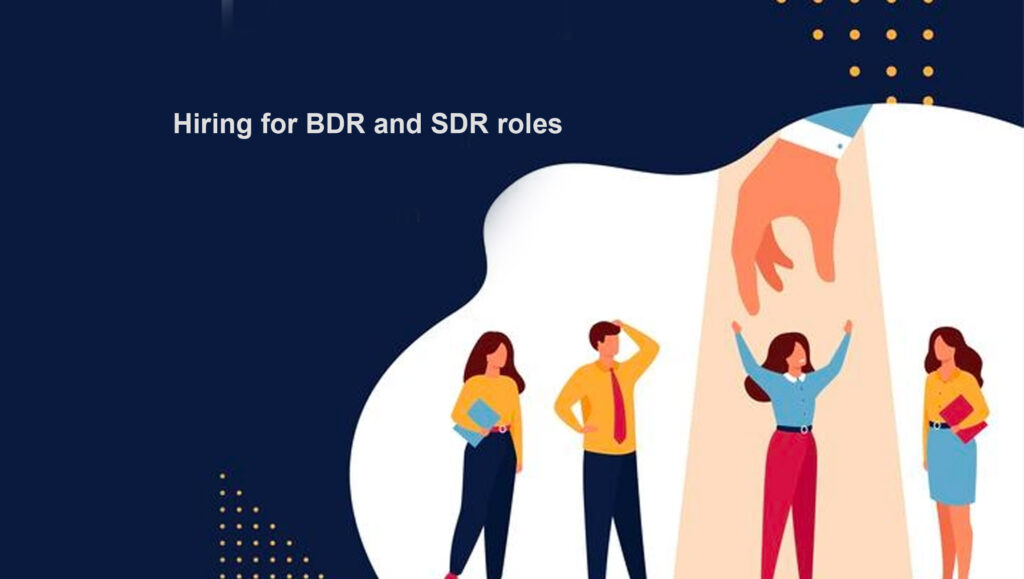BDR (business development representative) and SDR (sales development representative) roles are often lumped together, nevertheless, they are quite different from each other!
To many, the difference between an SDR and a BDR might be negligible or they might have one person bearing the responsibilities of both in some teams. A BDR and an SDR are seemingly two sides of the same coin, the end goal is the same – to qualify leads and drive revenue. Yet you can try to go a little deeper and understand both the roles are doing sales in contrasting ways and they fulfill different set of expectations for their customers and organizations.
Read More: SalesTechStar Interview With Tara Kelly, CEO At SPLICE Software
While hiring for SDR and BDR, a tech company should keep in mind the following two things:
- SDRs are responsible for inbound lead qualification, and
- BDRs are mostly involved in outbound lead prospecting
Let’s take a close look:
SDR (Sales Development Representative)
An SDR is a junior level sales person, who will be assigned work in inbound sales. He is primarily responsible in handling clients through phone, monitoring complaints that come to the organization through various channels and transferring or escalating customers to other departments through the sales pipelines.
Key Skills of an SDR are:
-
Curiosity
If you are about to hire an SDR for your B2B sales teams, ensure that the person is curious to learn new things and adapt to an evolving B2B sales environment. Evaluate an SDR on the basis of:
- What kind of questions he or she asks about the organization?
- Is he curious to know about the work culture of the organization?
- Are they able to create meaningful conversations with you during the interview?
-
Coachable
Besides the quality of being a curious crow, an SDR should be coachable! No matter how many years of experience the SDR has, he should be willing to learn new things in your organization. Evaluate on the basis of the following:
- Throw a mock situation and see how he deals with a prospect on call.
- Share your feedback on the areas of improvement and observe his reaction(s)!
- Ask him to repeat the role play and see if he improvised.
-
Articulate
A good SDR will always have clarity in thoughts. They will convey it by striking the right conversation tactics. Evaluate for your SDR position on the basis of:
- Why he choose to work at your organization? Why does he want to leave his current place of work?
- Try to assess the structure of their storyline. Is it impactful? Could she/he convince you to hire him?
BDR (Business Development Representative)
Unlike the SDR, a BDR would mostly be responsible for outbound sales. He will proactively reach out for new clients, try to develop new client relations, promote services through various means like networking, sales, marketing and pipeline management.
Key Skills of a BDR are:
-
Social Seller
A business development representative is mostly involved in outbound selling, he needs to interact with customers and so, he must possess social selling skills. You can evaluate by:
- Throwing a mock test in front of him and observe how he is interacting with new prospects.
-
Creative Thinker
Not only a BDR, every sales person should be a creative thinker. Sales strategies and methods can go stale in no time. A BDR should come up with new selling ideas so that brands can interact with customers in a meaningful way.
-
Thought Challenger
BDR’s are mostly found meant for slightly junior positions and they are mostly questioned for their sales decisions. A BDR should be able to bear those objections and think on her/his feet to give quick responses. You can evaluate your new BDR based on:
- Throwing a mock test, observe his answers and raise objections on his answers.
- The way she/he responds to the objections
-
Time Manager
Time management is the most important skill for any BDR. A BDR should be able to call 100 prospects, shoot 50 personalised mails and go out to meet customers in person with ease and proper time management.
Final Word
When you put both of these roles together in an organization, they work to achieve the same goal – to generate leads, qualify them, convert into clients and increase revenue. For a successful sales team, it is essential that SDRs and BDRs work in tandem with each other.
Read More: SalesTechStar Interview With Jeff Moore, VP Of Business Development At Blue Horseshoe





















